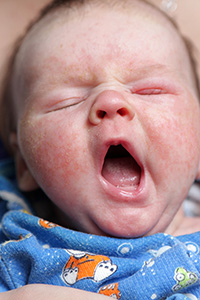
Babies and children with eczema, also known as atopic dermatitis, often have a family history of eczema, asthma or allergies. They also have a much higher chance of developing environmental and food allergies, as well as asthma.
In fact, a 2003 study published in the journal Pediatrics showed up to 80 percent of children with eczema go on to develop allergies and/or asthma, while up to 30 percent of patients with eczema may also have a food allergy, compared to 1-3 percent in the general population. This progression of developing eczema in infancy, followed by allergies and asthma as the child gets older, has been dubbed the “atopic march.”
Allergy testing should be considered if the eczema is difficult to control or if there is suspicion of an environmental or food trigger based on the history.
Family history
Kids who have one parent with eczema are at greater risk for developing the condition—compared to the general population—with an even higher risk if both parents have eczema.
Prevention, research
Research on how to prevent the development of eczema is ongoing. A recent study evaluated whether applying moisturizers to the skin in high-risk babies—those with a sibling or parent with eczema—could prevent development of the condition. Babies in the intervention arm of the study had moisturizer applied all over their bodies every day for six months; at the end of the study, these babies were almost 50 percent less likely to have eczema compared to the control group that didn’t receive moisturizers.
Other studies looking at the effects of administering probiotics to pregnant moms and their babies, or supplementing with vitamin D, have shown conflicting results in preventing the development of eczema. More studies are needed to clarify whether these treatments should be recommended.
Adulthood
Eczema flares may become less intense, less frequent, or even go away as the child gets older; this is more likely if the eczema is mild to begin with and if the child is non-allergic. About 30-50 percent of eczema cases will go away by adulthood, according to a 2013 study that looked at atopic dermatitis in adolescent and adult patients.
 (541) 233-4064
(541) 233-4064 
